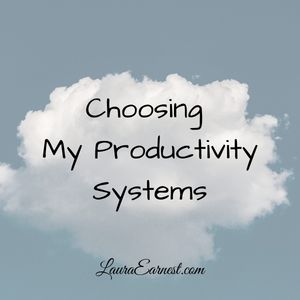Last week I gave some guidelines about how to change up your productivity systems. It’s not just a matter of choosing the tools, but also a matter of determining what the system of record is for each type of information. The system of record is the one that you have determined has the truth, even if you access the information from multiple places.
This was originally intended to be one article, but when I hit 3000 words I decided to break this up over the next few weeks to make it easier on all of us. 🙂
Today we will talk about some things that I considered with my systems and why I chose cloud-based for most of them. I will follow it with articles on the specifics of my productivity systems.
Fluidity with Systems of Record
The question of system of record becomes rather academic when we consider that so many of our tools automatically sync with others.
Some examples of this:
- My email program on my phone syncs with my email account, so that email I send on my phone automatically appears in my Sent folder for my email.
- My calendar application on my phone automatically pulls down the latest information from my Google calendar, and events that I add on my phone automatically go to the Google calendar.
- My contacts on my phone are synced with my contacts from Gmail using a utility on my phone that keeps both up to date.
Looking at these synchronization methods, it seems pointless to designate a system of record. But there are a couple of considerations that stem out of the fact that all of my systems of record are cloud-based.
Why Choose Cloud-Based for a System of Record?
Remember that “cloud computing” means “someone else’s computer.” This means it has two sides to its choice as a system of record.
Advantage: the advantage to using a cloud-based system is that many tools can access the same data. In terms of a productivity system component that means you don’t have to wait until you are able to use a single tool to enter or retrieve the information. I don’t have to wait until I am at my desk at home to look at my calendar.
Disadvantage: Having your data on someone else’s computer puts you at risk for server outages and dropped service. If a service were to be hacked, shut down or go bankrupt, your data is at risk for being irretrievable. That means you have to prepare for this eventuality. It is also a risk if you rely on a single machine, such as your home computer. I always recommend building in system redundancy for critical information.
Don’t Just Settle
Far too often I see people pick a system of record by picking the tool without considering what they need to do with it. Then a long period ensues where the person tries to wrestle with the system to make it do what they need.
Take it from me, when you wrestle with software, the software always wins.
It’s far better to consider the quantity of information, where you need to access it and how you want to access it before settling on a tool.
Article Series
- Overview Choosing My Productivity Systems (this article)
- Calendar [timed-content-rule id=”16318″]My Productivity System: My Calendar Setup[/timed-content-rule]
- Tasks [timed-content-rule id=”16317″]My Productivity System: My Task Setup[/timed-content-rule]
- Notes [timed-content-rule id=”16319″]My Productivity System: My Notes Setup[/timed-content-rule]
- Email and Contacts [timed-content-rule id=”16320″]My Productivity System: My Email and Contact Setup[/timed-content-rule]







